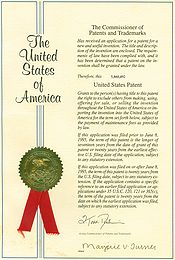What is a Patent?
A patent is a piece of paper which allows you to stop other people from making your invention without your permission. There are several different kinds of patents: plant patents, design patents, provisional patents and utility patents. The patents most people are familiar with are utility patents. Utility patents cover mousetraps, one-click buying on Amazon.com as well as other new, useful and non-obvious products and methods.
patents: plant patents, design patents, provisional patents and utility patents. The patents most people are familiar with are utility patents. Utility patents cover mousetraps, one-click buying on Amazon.com as well as other new, useful and non-obvious products and methods.
Not all Patents are Created Equal.
Your patent may be very strong, or very weak depending upon several factors. A strong or “broad” patent covers not only your invention, but a wide swath of alternatives as well. Competitors can easily knock off a weak or “narrow” patent by changing one or two aspects of the invention. What make a patent strong or weak? The novelty of the invention, the similarity of items already made public, the cooperation of the government patent examiner and of course, the skill of the patent attorney all play a role. While a great patent attorney is not going to be able to make a silk purse out of a sow’s ear, a bad patent attorney can certainly work that magic in reverse.
Patent Pros.
A broad patent provides you a monopoly in your marketplace. Items with a high markup are especially well-suited for patent protection. Without a patent, the market would simply drive the price of your product down to just above the cost of manufacture. You can still sell your invention, even while the patent is in the “pending” stage. Because the Patent Office maintains pending patents confidential for eighteen months, you can sell your invention, while your competitors are kept at bay wondering what your patent application may or may not cover. You can also sell or license your patent rights to a third party in exchange for a lump sum payment and/or a royalty stream. Patents last for 20 years from the filing date.
Patent Cons.
Patents are expensive. You can, of course obtain a weak patent for little money, but quality patents, even on simple machines can end up costing $9,000 or more over the course of the application process. The application process can be lengthy, often taking three years or more. Additionally, it can be very expensive to defend your patent. Unless you can find an attorney to defend your patent on a contingent fee basis, you may have to spend several hundred thousand dollars to have your day in court. As the infringer faces similar costs, patent infringement cases are far less likely to go all the way to a jury than many other types of disputes.
Do You Need a Patent?
This is a question only you can answer. A patent attorney answers this question from the perspective of whether the patent attorney could use an additional $9,000. You answer the question from the perspective of knowing your business better than anyone else. Where patent attorneys can help is in offering advice (often at no cost) to guide you through the questions you need to ask yourself. What kind of annualized profit can I expect with a patent? How many years, if ever, before the patent pays for itself? Are there non-infringing alternatives competing, or likely to compete, in the market-space? Will my product be obsolete before the patent issues? Will less expensive “trade secret” protection suffice?
Get the Facts.
Once you have the facts, the question boils down to a business decision, unique to your company. A patent by itself is not going to generate income. You still need a great invention and marketing plan. Many times patenting an invention is not the right answer. Your first step should be to get the facts before your invention falls into the pubic domain and you lose your right to patent your invention at all.





Recent Comments